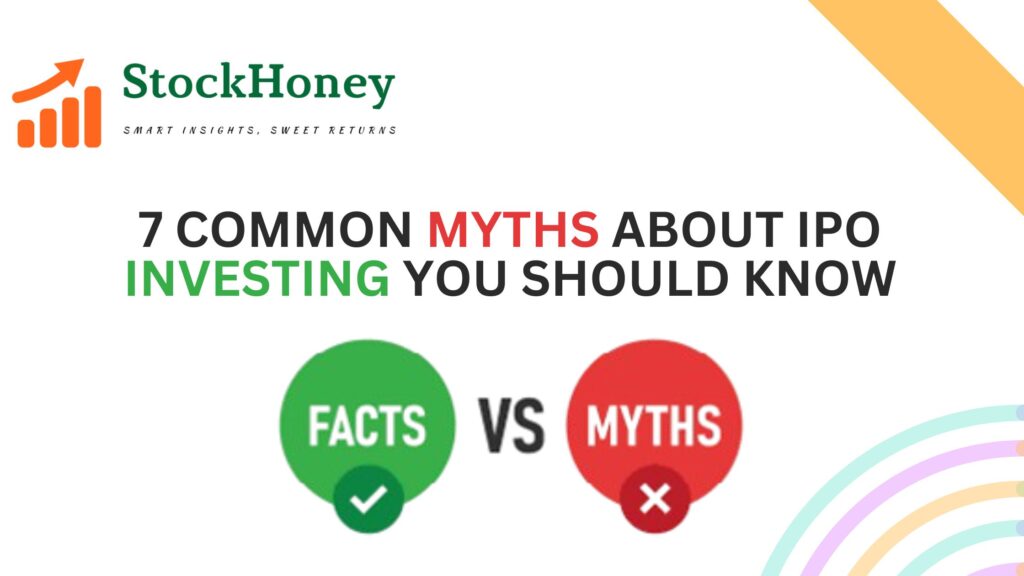An IPO can be an exciting opportunity, especially for retail investors. Many investors find the idea of investing in a company’s shares early and watching its price soar after listing appealing. However, many investors approach IPOs with preconceived notions that can skew their judgment, this could lead to unrealistic expectations or poor investment decision. In this article, we will aim to clarify some widespread myths regarding IPO investment and empowering investor to make smarter, well informed investment decision.
What Is an IPO?
Before debunking some IPO investing myths , let us first understand what is an IPO?
IPO is a process by which a private company offers its shares to the public for the first time. The funds raised through the IPO is used by the company for growth initiatives, business expansion or for debt repayment.
IPOs in India are regulated by the Securities and Exchange Board of India (SEBI), ensuring transparency and for protecting investor interest.
IPO Investing Myth 1: IPOs Always Deliver Quick and Guaranteed Profits
Reality:
While some IPOs have performed very well on the listing day, not all have been able to do the same. While company such as Nykaa was able fetch good returns when listed, others like Paytm underperformed after the listing. Factors such as market sentiment, valuations, and company fundamentals decide how an IPO performs. Market conditions and broader economic conditions can impact even high profile IPOs.
Counting on an IPO to guarantee quick profits is risky, especially if you’re not prepared for possible losses.
Pro Tip: Just don’t go by the hype created by an IPO. Always look at the fundamentals of the company, its business potential and revenue model before deciding to invest in an IPO.
IPO Investing Myth 2: IPOs Are Meant for High Net Worth Investors
Reality:
IPOs in India are so structured that all kinds of investors can take part, including retail investors. SEBI has made it mandatory that at least 35% shares in an IPO should be allotted to retail investors. Through this process, retail investors are not dominated by Institutional investors or high net worth investors. To improve retails participation, there have been instances when companies have issued shares to the retail investor at a discounted price. For instance, Coal India offered a 5% discount on the issue price of Rs.245 to retail investors.
IPO Investing Myth 3: All IPOs Are Underpriced and Offer Great Value
The Reality:
Many believe that the IPOs are always undervalued and investing in an IPO is a surefire way to the get the shares of the company at a low price. However, in reality companies and their under- writers aim to price the share based on the estimated market value, reflecting demand and prevailing market conditions.
At times, the IPOs may even be overpriced due to hype generated, which can result in poor performance after listing.
Pro Tip:
Before investing in an IPO, compare the company’s valuation indicator such as the price-to-earnings (P/E) ratio with other companies in the same sector. This will help an investor to assess whether the price set for the IPO is reasonable or inflated.
IPO Investing Myth 4: IPOs Are a Safe Bet for Beginners
The Reality:
Although IPOs provide exciting opportunities for investment, they are not risk free. Investing in an IPO requires understanding the company’s financial health, business and the revenue model and the industry trend. Many beginners or first timers mistakenly view IPO as a guaranteed win, which can lead to unexpected losses at times.
For example: Paytm’s IPO in 2021 debuted with high expectations, but the price of the company’s share fell significantly after listing. This shows that not all IPOs deliver short term gains on listing even if the brand is quiet well known.
IPO Investing Myth 5: IPOs Are the Best Way to Invest in Startups
The Reality:
Not all companies coming with an IPO are startups. Many established companies also come up with their IPOs. While startups like Zomato, Swiggy, Nykaa and Paytm have gone public, traditional companies like HDFC AMC, IRCTC and LIC also have launched their IPOs.
Although Startups have the potential of higher growth but they also carry greater risks due to unpredictable profits and changing market conditions. As an investor it is important to review their past performance and future growth plans before investing.
IPO Investing Myth 6: IPO Applications Are Always Fully Allotted
The Reality:
IPO oversubscription is quiet common in India, especially for highly anticipated IPOs. When demand exceeds supply, shares are allocated on lottery basis in case of retail investors. This means that not all retail applicants who have applied for the IPO receive the allotment, as a result some may end up with no allotment at all.
For instance, IPOs like Nykaa and MapmyIndia were subscribed several times over the number of shares available for allotment, thus leaving many investors without allotment.
Pro Tip: To increase your chances of allotment, apply through family members with demat account, staying within the retail investor limit of ₹2 lakh per application.
IPO Investing Myth 7: IPOs Are Immune to Market Trends
The Reality:
The performance of an IPO is impacted by market conditions. A bullish market may boost the performance of an IPO, while in a bearish market the performance may be impacted. Other external factors such as geopolitical events, economic policies and industry outlook could impact the performance.
How to Invest Wisely in IPOs?
Now that we have debunked some of the myths around IPO, it is time to get the actionable tips on smart investing.
Read the Red Herring Prospectus (RHP):
- The RHP will give you the details of the company’s financials, business model, risks, and use of IPO proceeds. As an investor, carefully read through the RHP.
Analyze the Company’s Fundamentals:
- Go through the revenues, profitability, debt levels, and industry position.
Understand Valuations:
- Compare the IPO price with listed peer companies.
Consider long-term potential:
- Choose an IPO with robust fundamentals and a strong growth plan rather than being aggressive on listing day gains.
Conclusion
Investing in IPOs can be rewarding, however it’s important to avoid common misconceptions and unrealistic expectations. Beliefs like IPO provides guaranteed returns can lead to mistakes. By understanding the facts and doing thorough research, you can take an informed decision.
Always remember, be it IPO or any other investment decision, just don’t go by hype or hearsay, always do your research, read reliable sources like the RHP of the company available on the SEBI website, and then take the investment call.
Happy IPO Investing!
Related Information & Articles
Current & Upcoming IPOs in India
Should You Invest in an IPO? 6 Factors to Consider
8 Important Insights to Decode the Red Herring Prospectus
Zomato IPO: An Interesting IPO Case Study


